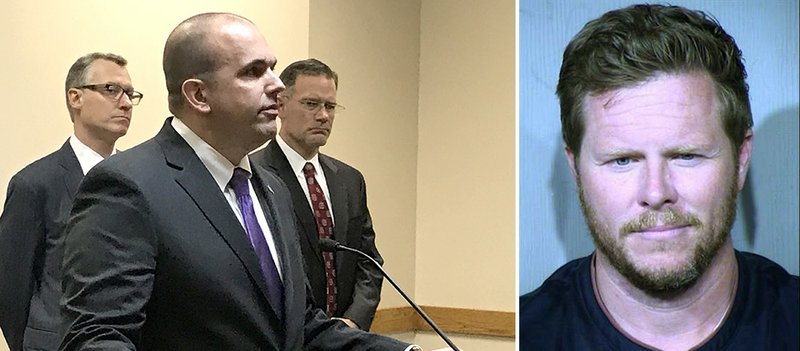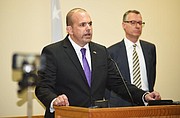SPRINGDALE -- As many as a dozen women at a time stayed in one Springdale home in an adoption fraud scheme involving 30 or more pregnant women a year, according to the U.S. Justice Department.
"Make no mistake. This case is the purest form of human trafficking," said Duane "Dak" Kees, U.S. attorney for the Western District of Arkansas.
Kees unveiled a 19-count federal grand jury indictment against Paul D. Petersen, 44, of Mesa, Ariz., at a 1 p.m. news conference Wednesday at Springdale City Hall.
Petersen's law firm enticed pregnant Marshall Islanders close to delivery to give up their children for adoption, paid air fare to bring them to the United States for that purpose and then gave them airfare home, all in violation of a specific clause in a treaty with the islands' government forbidding travel solely for that purpose, according to the indictment.
The federal investigation began three years ago when the Washington and Benton county bar associations told investigators something was wrong with the practices of adoptions handled by the Paul D. Petersen law firm, which has a mailing address and representatives in Fayetteville, Kees said.
The investigation isn't over, he said. More individuals associated with the Petersen firm and with other firms with similar practices are under federal scrutiny, he said.
The scheme started in 2014 and possibly earlier, according to the indictment.
Petersen is also the elected county assessor of Maricopa County, Arizona's most populous.
Defense attorney Matthew Long of Scottsdale, Ariz., who represents Petersen, didn't return a message Wednesday. Messages to both the Mesa and Fayetteville offices of Petersen's law firm also weren't returned.
Some of the expectant mothers who were close to childbirth slept on the floor while housed four to a room, Kees said. They were enticed to Northwest Arkansas from the Marshall Islands by promises of money for giving up their children, once born, to parents seeking adoptions through the Arkansas courts.
The adoptive parents paid the expectant mothers' housing and food expenses, which Petersen's firm deliberately inflated, the indictment says. For instance, adoptive parents paid lodging expenses for the mothers when they were all staying in the family home of Maki Takehisa, 39, Petersen's indicted co-conspirator, the indictment says.
Housing and food expenses were minimal at the home, the indictment states. Takehisa is named in four of the 19 counts in the indictment, which the grand jury returned Monday.
"One of the mothers who cooperated with us said they were treated like property," Kees said.
The expectant mothers were told they would be well paid and well cared for, but were dependent upon the Petersen's law firm once they arrived in the United States, he said.
Petersen was being held in lieu of a $500,000 cash bond Wednesday in the Maricopa County Jail on state charges in Arizona. Similar housing of pregnant women there led to 32 state charges based on Petersen's practice of enrolling those women for Arizona Medicaid benefits for which they weren't eligible since they were only temporary Arizona residents.
Petersen also faces 11 similar charges in Utah, that state's attorney general announced. He's licensed to practice law in Arizona, Utah and Arkansas, according to his law firm's website.
"Petersen is accused of using false information to place the Marshallese women on state-funded health care in order to pay for delivery costs, bilking the state out of more than $814,000," said a statement from Arizona Attorney General Mark Brnovich.
Arkansas pursues the only federal case because the federal investigation started here, Kees said. Petersen will have an appearance in federal court in Fayetteville, tentatively set for Oct. 29, Kees said. Arkansas Attorney General Leslie Rutledge attended Wednesday's news conference. Kees said state charges in Arkansas haven't been ruled out.
The adoptive parents in these cases, which federal investigators believe to be in the hundreds, aren't believed to have been aware of the fraud scheme and aren't targets of the investigation, Kees said. It appears their adoptions are binding under Arkansas law.
"Mr. Kees is right in that this is a complex issue" on paternal rights of the children involved, said Josh Bryant of Rogers, a private attorney, adoptive parent and long-time advocate of adoption reform. He and state Rep. Clint Penzo, R-Springdale, co-authored an adoption reform bill in the last legislative session, but failed to get it passed.
"Normally an adoption would be final after six months under any normal circumstances," Bryant said. "But the issue of fraud and deception here might make a difference. If it does, though, the guiding principle the courts follow is the best interest of the child. The best interest of the child will almost always be to stay at home."
With the scheme starting in 2014, children involved could be pre-schoolers by now.
Takehisa, of 2006 Cardinal Drive in Springdale, was charged Wednesday with one count each of money laundering and mail fraud. Takehisa also was charged earlier this year in U.S. District Court in Fayetteville with aiding and abetting alien smuggling, a violation of the Compact of Free Association.
Marshall Islands citizens can travel to the United States under the compact, a treaty between the two countries. The United States administered the islands for years after World War II and used a portion of those islands for atomic bomb tests. Some of the rights extended to Marshall Islanders were a form of recompense for those tests, according to Eldon Alik, consulate general for the Marshall Islands, who has an office in Springdale.
Four women told authorities they came here specifically to have a baby for adoption, according to a complaint in Takehisa's first case. Two said Takehisa offered to pay them $10,000, pay the airfare and put them up at a house in Springdale until they gave birth. One said she was actually paid $6,000, the other $4,000. The money was paid in cash by Takehisa after the babies were born, they said.
The majority of adoptions approved in Washington County are for Marshallese children, court officials say. While Northwest Arkansas has the largest concentration of Marshallese in the continental United States, they are still a minority. The high rate of Marshallese adoptions in Northwest Arkansas and elsewhere has drawn concern from Washington and Benton County judges for years, 4th Judicial District Circuit Judge Doug Martin said last year.
"Nine out of 10 adoptions I do are for a Marshallese child," Martin said at the time.
The large number of Marshallese women giving up their children for adoption caused widespread concern among the area's legal, medical and advocacy communities in Northwest Arkansas in 2015. They worried some of the women were signing documents in a language they didn't understand and may not know they have no rights to the child once the baby is adopted.
Community leaders openly questioned whether the women know all their rights, such as the right to withdraw consent for an adoption. Others expressed concern about how the expectant mothers are reimbursed for expenses related to their pregnancies.
Bringing any Marshallese parents or parents-to-be to the United States from the islands for the purpose of carrying through an adoption breeches a 2003 amendment to the compact between the two countries allowing travel without visas.
There are concerns even in cases where a Marshall Islander has lived in the United States for years, said both Alik and Melisa Laelan, a Marshallese language interpreter for regional courts and an advocate for Arkansas' islander population. They were interviewed on the topic last year.
Adoptive mothers are rarely represented by their own attorneys, Alik and Laelan said. The adoptions are most often arranged through attorneys of the prospective parents. The Marshallese government is anxious to see the rights of its citizens are protected, Alik said.
The cultural difference between adoption in the Marshall Islands and in the United States is well known, Alik and Laelan said.
"I was adopted, and I saw my real parents all the time," Alik said. In the islands, adoption is an open system where all parties maintain a close relationship.
In the United States, though, a parent who gives up a child for adoption forfeits her rights as a parent. For instance, there is no right to visitation or any role in the child's raising. The Marshallese government wants to ensure its citizens are fully aware of what they are giving up and suspect that's often not the case. Even an adoptive parent who realizes the difference or who has doubts toward the end of the process may fear the repercussions of backing out of a deal.
The Marshallese government on the islands has begun taking a more protective stance, Alik said.
In March, Marshall Islands officials charged a Springdale man, Justin Aine, with human trafficking, according to the Marshall Islands Journal. Kees said Wednesday that Aine's case and Petersen's are linked but declined to comment on how, and whether the Marshallese government will file any charges in the Petersen case.
Aine, 46, was charged by the assistant attorney general with one count each of trafficking in person, unlawful solicitation and monetary inducement, according to a report in the Journal.
Aine is accused of recruiting Susan Koraja by giving her $120 and the promise of $10,000 in exchange for her giving up her 1-month-old for adoption when they reached the United States, according to the newspaper. Charged along with Aine were Aiti "Hatty" Anidrep, 49, and Sally Abon, 53.
Aine promised Koraja he would help her family move to the United States if she gave up her child for adoption, according to the Journal.
In Benton and Washington counties, at least four Marshallese women since 2015 have been convicted of fraud involving adoptions. In all the cases, the pregnant women accepted money from two sets of would-be parents and failed to give either set the child when he was born.
The charges
Federal charges faced in Arkansas by Paul Petersen of Arizona:
• One count of conspiracy to smuggle illegal aliens for commercial advantage and private financial gain
• Four counts of aiding and abetting in alien smuggling for commercial advantage and private financial gain
• Seven counts of wire fraud
• Five counts of mail fraud
• One count of conspiracy to commit visa fraud
• One count of conspiracy to commit money laundering
More charges could be added later, the U.S. Attorney said Wednesday
NW News on 10/10/2019


